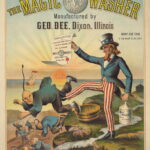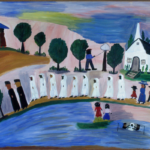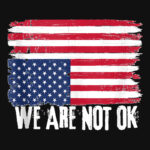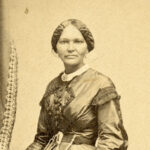
Why Study African American Literature? (0)
3/21/25 •
Maybe, assuming there is a God who created us all, he created a damned diverse world full of people the MAGA crowd consider “other.” Our civilization was not created solely by dead white men — they just had the most effective flacks promoting their product. Many rivers lead to the sea that comprises our world.
To better understand the diversity of ingredients added to the human gumbo, let us consider the following questions: Why do I study (and enjoy) African American literature? Why is study of African American Literature—and, by extension, other minority literature—important for all, including the MAGA minions?
Recent Posts
Marie Tharp’s Underwater World (0)
11/19/23 •
Marie Tharp was a pioneer, a woman dealing with a male-dominated and chauvinistic scientific hierarchy. Marie became a geologist only because of the opportunities for women to enter male-dominated fields during World War II. She landed a job with Maurice “Doc” Ewing’s research group at Columbia University—a group that later became what is now Lamont-Doherty Earth Observatory—because she could make geologic maps. Few thought she could do much more than that.

Henry V and the bonds of shared sacrifice (0)
11/06/23 •
I am a child of the Cold War. Both my parents were Air Force veterans. I was born on an Air Force base. Vietnam and the Draft were constant companions through my youth into my teens—even though the draft ended before I became eligible for it, I was among the first cohort of young men required to register for Selective Service when registration for a potential draft was resumed in 1980. I saw the immediate connection formed when strangers who served—no matter what branch, no matter what era, no matter what war (or lack thereof)—met.

The Castaways (0)
11/03/23 •
I have had a hard time figuring out what to say about Allen Ginsberg’s Howl. It strikes me as both a celebration of and commiseration with those mainstream society has deemed unfit. They are the hustlers, the wanderers, the free spirits, the drunks, the junkies, the freaks, the sexually adventurous, the mad (both clinically and otherwise), and anyone else who refused to conform to what society considered normal: man with a 9-to-5 job marries a woman who aspires solely to become a homemaker; a couple where each sleeps in separate beds yet that somehow merges—only in the missionary position and only with one another—to produce the requisite 2.1 children; a couple that proudly displays its devout observance of Christianity on Sundays; a couple whose only mind-altering substances are cigarettes, coffee in the morning, and a highball or beer after work.

African Days of Future Past (0)
10/27/23 •
The Afrofuturism movement offers a uniquely African lens on what some call science fiction and others call speculative fiction, offering diverse perspectives on such staple questions of the genre like “What if?” or alternate explanations that illuminate why things are like they are now.
The three stories we read in the Afrofuturism vein—“Bloodchild” by Octavia Butler, “Give me cornbread or give me death” by N.K. Jemisin, and “The comet” by W.E.B. Bu Bois—offer insights into different aspects of African American history and, in some cases, glimpses of parallels in the experiences of other oppressed groups.

Daughters of the Dust (0)
10/20/23 •
One of the main takeaways I pulled out of the fog was the conflict immigrant families face between preserving their native (for lack of a better term) culture and assimilating into that of their new home.
. . . I will illustrate the conflict using a story told in a visual medium: Julie Dash’s film, Daughters of the Dust. The film, set on Saint Helena Island off the coast of South Carolina, illustrates the lives of three generations of the Peazants, a Gullah family who are about to leave the island for a new life in the North.

Walker, Rankine, Morrison—and John Henry (0)
10/13/23 •
The stories “Everyday Use” by Alice Walker, “Citizen: ‘You are in the dark, in the car…'” by Claudia Rankine, and “Recitatif,” by Toni Morrison, focus on the burdens of identity—whether accepted or forced upon one—on minorities, especially African Americans.
All three of these stories touched me personally, especially as all three addressed elements of my own life from my dad’s attitudes toward our rural Southern heritage as in “Everyday Use,” the repeated assaults of everyday racism on my own life, as in “Citizen,” or the social upheavals of the 1960s and 1970s as in “Recitatif.”

Let America Be America Again: A Personal Reflection and Critical Race Theoretical Rant (0)
10/06/23 •
I grew up a mixed-race kid in the waning days of Jim Crow in Louisiana. The Vietnam War was raging. Anti-Asian sentiment ran high, and the racists I grew up around made no distinction between the Vietnamese we were fighting and any other East Asian group when it came to expressing their hate. I often heard my Asian brethren disparaged—in the early 1960s, being part Chinese was enough to get my mom and I threatened with death if my dad didn’t remove us from Louisiana.
We didn’t leave.

Charlotte Perkins Gilman and the Oppression of Women (0)
9/22/23 •
“The Yellow Wall-Paper” by Charlotte Perkins Gilman (known at the time of publication as Charlotte Perkins Stetson) captures a time when the oppression of women was widely assumed to both natural and appropriate. But, as we see in the story, this allegedly natural and appropriate treatment exacted a devastating toll on women psychologically and physically.

June Jordan, rape, and #metoo (0)
9/15/23 •
June Jordan’s “Poem about My Rights” demands that the world start seeing her as she is: as a woman, as a survivor of assault, as a descendant and legacy of state-sponsored violence against other states and peoples. I read it and felt her anger toward colonialism, segregation, discrimination, minimization, and dismissal.

African Americans Speak of Women (0)
4/28/22 •
At the risk of appearing to define women’s roles through a man’s eyes, Langston Hughes’ metaphorical invocation of rivers in his poem, “The Negro Speaks of Rivers,” seems applicable to the roles of women in African American society. This, I argue, is not merely a male notion.

What Is, or What Should Be, Black Art? (0)
4/25/22 •
What is, or what should be, Black art? The question at first may seem a strange one to ask in the twenty-first century, but, given the continued African struggle for acceptance as equals in a world built upon a foundation of white European hegemony over people of color, there remains much to discuss.

The Irony of Loving a Country That Doesn’t Love You (0)
3/25/22 •
How does one love a country that does not love them? This is a question that many immigrants and descendants of immigrants must answer for themselves when living in new lands full of earlier arrivals hostile to later arrivals.

Cowardice Kills (0)
2/10/22 •
Government officials are tasked with responsibility of protecting the health of every student, of every teacher, of every worker—and of everyone those students, those teachers, and those workers might come into contact with. Their efforts to make mask-wearing optional boosts the sense of entitlement of those who prioritize the exercise of their parental whims over the legitimate health interests of everyone else.
As lessons go, it is a horrid lesson to teach our students. The answer to the Biblical question, “Am I my brother’s keeper,” is, according to the example given by the governor, the school board, and the state legislature, “No. Whatever happens to my brother is his problem.”

A Meditation on the Nature of Sacrifice (0)
9/14/21 •
[Editor’s Note: I submitted a version of this as a column to my newspaper shortly after Memorial Day 2020, but recently found out it had never run. It was relevant to the political chaos with respect to our COVID-19 response then. Sadly, it remains relevant now. I have updated it somewhat for where the dis-United States seems to be in September 2021.

The real horror of Get Out (0)
7/25/21 •
I remember the Oscar buzz about Get Out[1]—and was impressed that a screenplay for a “horror” film actually broke through the usual Academy of Motion Pictures Arts & Sciences snobbery and won. While I would not be surprised if Academy members failed to take all the lessons buried in screenwriter/director Jordan Peele’s vision to heart, there is more than enough substance in that “genre” film to keep it relevant for decades—either as a reminder of what was, or a warning of what could (again) be.

Four African American Writers on the Status of African American Women (0)
7/19/21 •
In reading the works of African American writers from the eighteenth through the twentieth centuries, it becomes clear how frequently (and brutally) African American women were violated by white society—both slave-owning and otherwise. Even their erstwhile helpers failed to give them their due, often failing to see African American women at all, much less as equals, and treating them like children to be patronized rather than agents of their own fate.

Elizabeth Keckley’s Behind the Scenes; or, Thirty Years a Slave and Four Years in the White House: A Reaction (0)
6/29/21 •
What shocked me most about Elizabeth Keckley’s memoir is the dearth of anger—and abundance of undeserved charity toward those who enslaved her—that she expressed. Personally, I cannot reconcile her coerced servitude and unforgivable abuse with anything that might resemble a “bright side” as she calls it in her preface.

The Murder of Glen Tompkins: A Personal Story (0)
3/10/21 •
SHREVEPORT, La.—I’m not sure which staff photographer snapped the photo of my dad, George M. Lawrence, but one of them caught him checking out a wire photo on the copy desk of The (Shreveport, La.) Times. This was circa 1980, because The Times switched from hot type to cold type about 1978: The dreadful computer […]

Should the Government Be Involved in the Economy? (0)
6/21/20 •
Should the government be involved in the economy? In a word, yes. Any responsible government must be involved in regulating economic affairs. In an ideal world, labor and capital would negotiate as equals to set a fair price for work done. Producers and consumers would likewise negotiate as equals to set fair prices for products, etc.
But this is not an ideal world. . . .
Older Posts
- Moral skepticism in Dead Poets Society and Match Point
- (Would-Be) Emperors and Virtue Ethics
- The Social Contract and It’s a Wonderful Life
- Kantian Ethics in Horton Hears a Who!
- The Ultimate Flaw in Divine Command Theory
- It’s “OK,” dammit!
- What race(s) should I own?
- The Art of Receiving (or Not) a Critique
- How have I been harmed by Trump voters?
- The Election is Over: Where to Go from Here
- Lies, damned lies, and abortion statistics
- Season’s End
- Review: Busted
- The Future of Long-Form Journalism in the Age of the Digital Publishing Platform
- Survey: What Is a Landscape?
- New Frontiers
- Drugstore soda fountains: A bit of nostalgia, a lot of home
- Worried about Japanese nuclear fallout?
- Hallelujah! Notes from the Abyss restored!
- Hello world!
- Review: World Ocean Census
- RIP, Ronnie James Dio
- This Blog has changed
- Censorship by Amazon.com
- Review: Letters to a Young Journalist
- Review: Battle for the Southern Frontier
- Ascension Island Expedition — Ascension Island, Day Three: The Dive
- Ascension Island Expedition — Ascension Island, Day Two: Green Mountain
- Ascension Island Expedition — Ascension Island, Day Two: The Beach
- Ascension Island Expedition — Ascension Island, Day One
Featured Categories
Animals»
1/05/07 •
Weird, but true (another bear story)12/30/06 •
Welcome to the newly converted
Archaeology»
6/03/07 •
Ascension Island Expedition — Orkney3/13/07 •
Ascension Island Expedition — Caithness
Arctic»
12/30/06 •
Welcome to the newly converted
Ascension Island»
1/27/08 •
Ascension Island Expedition — Ascension Island, Day Three: The Dive1/20/08 •
Ascension Island Expedition — Ascension Island, Day Two: Green Mountain1/20/08 •
Ascension Island Expedition — Ascension Island, Day Two: The Beach6/22/07 •
Ascension Island Expedition — Ascension Island, Day One6/03/07 •
Ascension Island Expedition — Berwick-Upon-Tweed to RAF Brize Norton
Berwick-upon-Tweed»
Book Review»
4/12/14 •
Review: Busted11/25/10 •
Review: World Ocean Census3/18/09 •
Review: Letters to a Young Journalist3/08/09 •
Review: Battle for the Southern Frontier
Caithness»
3/13/07 •
Ascension Island Expedition — Caithness3/13/07 •
Ascension Island Expedition — Edinburgh to Thurso
Climate»
12/30/06 •
Welcome to the newly converted6/26/06 •
Lindzen needs a reality check on climate change
Diving»
Edinburgh»
Endangered Species»
12/30/06 •
Welcome to the newly converted
England»
6/03/07 •
Ascension Island Expedition — Berwick-Upon-Tweed to RAF Brize Norton6/03/07 •
Ascension Island Expedition — Strike! (Thurso to Berwick-Upon-Tweed)3/13/07 •
Ascension Island Expedition — London to Edinburgh3/13/07 •
Ascension Island Expedition — Mechanicsville to London
Indonesia»
1/03/07 •
The search for a missing airliner12/22/06 •
The story behind the image — Tramps5/15/06 •
Imminent eruption of Mount Merapi
Music»
4/25/22 •
What Is, or What Should Be, Black Art?5/10/10 •
RIP, Ronnie James Dio
Natural Hazards»
5/15/06 •
Imminent eruption of Mount Merapi
Orkney»
6/03/07 •
Ascension Island Expedition — Orkney
Rocky Mountains»
1/05/07 •
Weird, but true (another bear story)
Scotland»
6/03/07 •
Ascension Island Expedition — Strike! (Thurso to Berwick-Upon-Tweed)6/03/07 •
Ascension Island Expedition — Orkney3/13/07 •
Ascension Island Expedition — Caithness3/13/07 •
Ascension Island Expedition — Edinburgh to Thurso3/13/07 •
Ascension Island Expedition — London to Edinburgh
Scottish Highlands»
6/03/07 •
Ascension Island Expedition — Strike! (Thurso to Berwick-Upon-Tweed)3/13/07 •
Ascension Island Expedition — Caithness3/13/07 •
Ascension Island Expedition — Edinburgh to Thurso
Volcanism»
5/15/06 •
Imminent eruption of Mount Merapi

